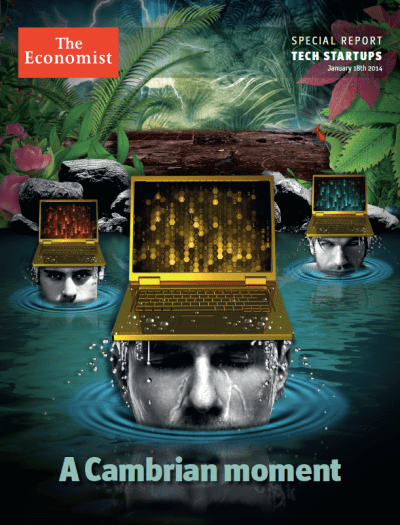A Cambrian moment — A special report from The Economist, by Ludwig Siegele
Cheap and ubiquitous building blocks for digital products and services have caused an explosion in startups. Ludwig Siegele weighs its significance.

Excerpt:
This special report will argue that something similar is now happening in the virtual realm: an entrepreneurial explosion. Digital startups are bubbling up in an astonishing variety of services and products, penetrating every nook and cranny of the economy. They are reshaping entire industries and even changing the very notion of the firm. “Software is eating the world,” says Marc Andreessen, a Silicon Valley venture capitalist.
This digital feeding frenzy has given rise to a global movement. Most big cities, from Berlin and London to Singapore and Amman, now have a sizeable startup colony (“ecosystem”). Between them they are home to hundreds of startup schools (“accelerators”) and thousands of co-working spaces where caffeinated folk in their 20s and 30s toil hunched over their laptops. All these ecosystems are highly interconnected, which explains why internet entrepreneurs are a global crowd. Like medieval journeymen, they travel from city to city, laptop not hammer in hand. A few of them spend a semester with “Unreasonable at Sea”, an accelerator on a boat which cruises the world while its passengers code. “Anyone who writes code can become an entrepreneur—anywhere in the world,” says Simon Levene, a venture capitalist in London.
Also see:
- Required reading: The Economist’s Special Report on Tech Startups — from by Ryan Lawler
Excerpt (emphasis DSC):
But where The Economist’s report could be useful is in helping those of us who follow this world every day to see the forest for the trees. In so doing, it we could possibly better understand the broader global impact that the spread of technology is having, how we’ve gotten here, and what the big trends are driving us forward. What it really means when software eats the world, as it were.









